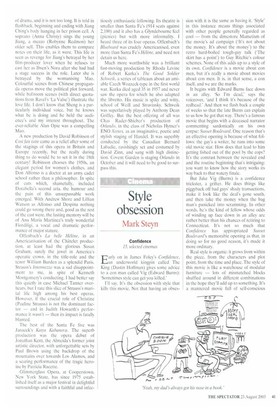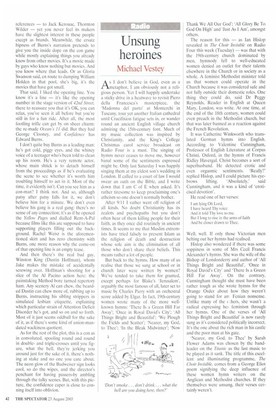Style obsession
Mark Steyn
Confidence
15, selected cinemas
E ally on in James Foley's Confidence,
an underworld kingpin called The King (Dustin Hoffman) gives some advice to a con man called Vig (Edward Burns): 'Sometimes style can get you killed.'
I'll say. It's the obsession with style that kills this movie. Not that having an obses
sion with it is the same as having it. 'Style' in this instance means things associated with other people generally regarded as cool — from the dimestore Mametism of the movie's ad campaign ('It's not about the money. It's about the money') to the retro hard-boiled tough-guy talk ('The skirt has a point') to Guy Ritchie's colour schemes. None of this adds up to a style of its own. Confidence is a movie about con men, but it's really a movie about movies about con men. It is, in that sense, a con itself, and we are the marks.
It begins with Edward Burns face down in an alley. 'Sc) I'm dead,' says the voiceover, 'and I think it's because of the redhead.' And then we flash back a couple of weeks so that the late Burns can explain to us how he got that way. There's a famous movie that begins with a deceased narrator commenting sardonically on his own corpse: Sunset Boulevard. One reason that's an effective opening is because of what follows: the guy's a writer, he runs into some old movie star. How does that lead to him getting fished out of the pool by the cops? It's the contrast between the revealed end and the routine beginning that's intriguing; you want to know how the story works its way back to that watery finale.
But Jake Vig (Burns) is a confidence trickster, a grifter. He does things like piggyback off bad guys' shady transactions, make it look like the deal's gone south, and then take the money when the bag man's panicked into scramming. In other words, he's the kind of fellow whose odds of winding up face down in an alley are rather better than his chances of retiring to Connecticut. It's not so much that Con.fidence has appropriated Sunset Boulevard's memorable opening as that, in doing so for no good reason, it's made it more ordinary.
Real style is organic: it grows from within the piece, from the characters and plot point, from the time and place. The style of this movie is like a warehouse of modular furniture — lots of mismatched blocks shuffled around in different combinations in the hope they'll add up to something. It's a mannered movie full of self-conscious references — to Jack Kerouac, Thornton Wilder — yet you never feel its makers have the slightest interest in these people except as brands. Meanwhile, the ersatz hipness of Burns's narration pretends to give you the inside dope on the con game while mostly explaining things you already know from other movies. It's a movie made by guys who know nothing but movies. And you know where that leads. Or as Gloria Swanson said, en route to dumping William Holden in that pool, she's big, it's the movies that have got small.
That said, I liked the opening line. You know it's a line — it's like the opening number in the stage version of 42nd Street, there to reassure you that it's OK, you can relax, you've seen it all before but you're still in for a fun ride. After all, the most footling trifle can get by on sheer charm: the re-made Ocean's II did. But they had George Clooney, and Confidence has Edward Burns.
I don't quite buy Burns as a leading man: he's got cold, piggy eyes, and the whiney voice of a teenager who's been told to clean up his room. He's a very remote actor, whose main shtick is to detach himself from the proceedings as if he's evaluating the scene to see whether it's worth him troubling himself to act in it. Most of the time, it evidently isn't. Can you see him as a con-man? I think not. And so, although patsy after patsy falls for it, we don't believe him for a minute. We don't even believe his gang is a real gang: there's no sense of any connection; it's as if he opened the Yellow Pages and dialled Rent-A-Pal because films like this are supposed to have supporting players filling out the background. Rachel Weisz is the aforementioned skirt and has zero chemistry with Burns, one more reason why the come-on of that opening line is an empty tease.
And then there's the real bad guy, Winston King (Dustin Hoffman), whom Jake makes the mistake of accidentally screwing over. Hoffman's shooting for a slice of the Al Pacino action here: the painstaking Method bore turned repertory ham. Any scenery Al can chew, the bearded Dustin can chew more of, rubbing up to Burns, instructing his sibling strippers in simulated lesbian etiquette, explaining which particular strain of Attention Deficit Disorder he's got, and so on and so forth. Most of it just seems oddball for the sake of it, as if there's some kind of union-mandated wackiness quotient.
As for the rest of the plot, this is a con as in convoluted, spooling round and round in doubleand triple-crosses until you figure, what the hell, they're jerking you around just for the sake of it, there's nothing at stake and no one you care about. The neon glow of the Budweiser sign looks cool, so do the wipes, and the director's penchant for having passers-by ambling through the talky scenes. But, with this picture, the confidence caper is close to conning itself into oblivion.



























































 Previous page
Previous page